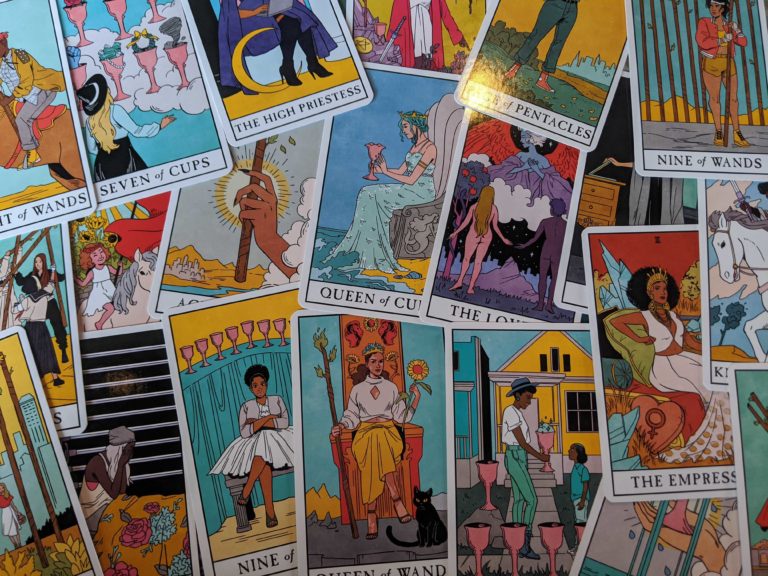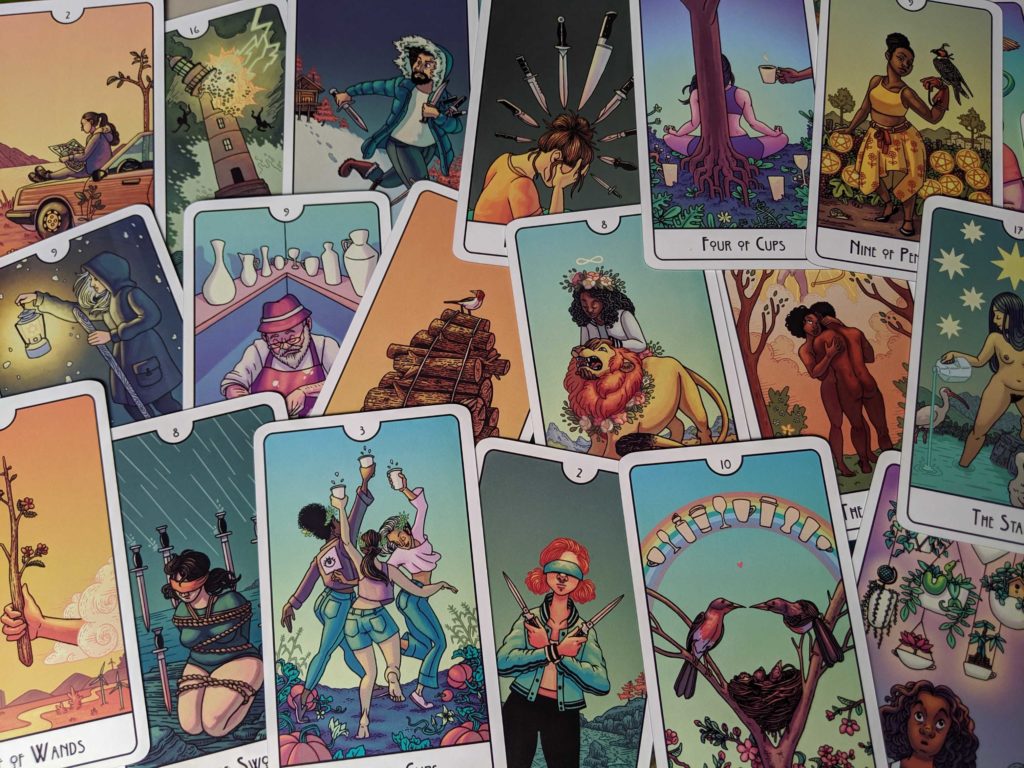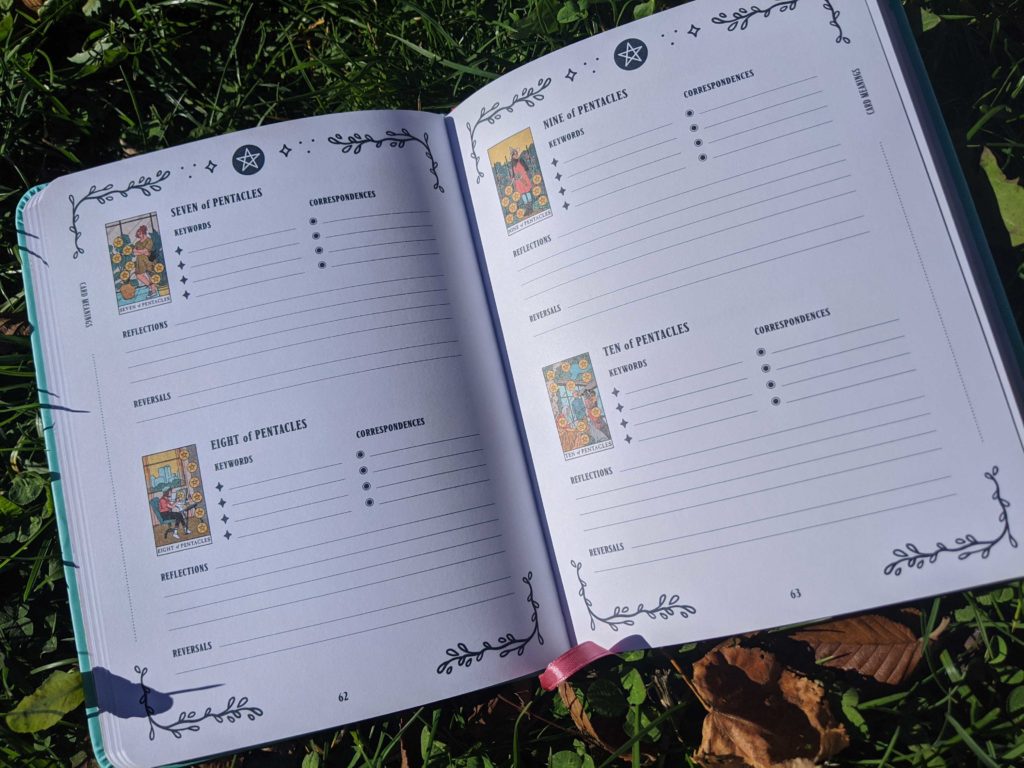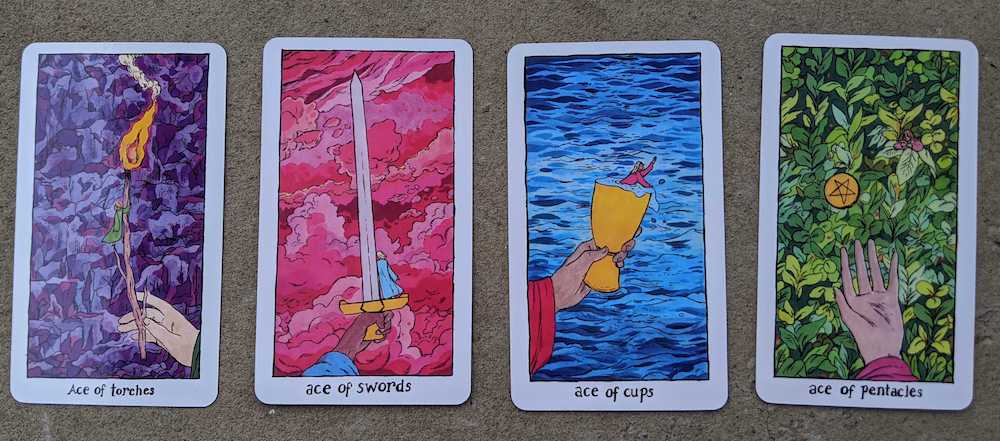
Tarot Resources for Apprentices
November 9, 2020 Jamey Alea 0 Comments
More than normal lately, folks have been talking to me about wanting to learn tarot and asking me for good resources for beginners. With everything that has been going on, this makes a lot of sense to me. Tarot is a great tool for dealing with anxiety, and there has been a lot of anxiety floating around lately. A lot of people feel a strong pull to divination magic. It can be both powerful and comforting, helping to give you a little glance into a future that feels scary and uncertain.
I love tarot for all these reasons too, so I’ve compiled some of my favorite decks, books, apps and more, that are suitable for beginners. There are so many resources out there, which is cool, but I know it can also be overwhelming. I hope my recommendations will make it feel a little more approachable!
Decks
One of the most appealing thing about tarot is the fact that tarot decks are so beautiful and there are so many of them. (Believe me, I know. Please don’t ask how many tarot decks I own because it’s a little embarrassing.)
Tarot readers build pretty personal relationships with their decks of choice, and choosing what deck you want to use is a really personal decision! That said, I do recommend starting with a derivative of the classic Rider-Waite-Smith deck for people who are just learning. Many resources you’ll find for learning lean heavily on this deck, and many other decks borrow symbolism from Pamela Smith’s art, so becoming familiar with the RWS deck first makes it more intuitive to learn and also easier to pick up new decks quickly later. (I originally struggled to learn with the Hermetic Tarot—which is gorgeous, but much more arcane and less intuitive.)
I have a real fondness for the Rider-Waite-Smith deck, but it is a little old-fashioned in a few ways, like with a lack of diversity and persistent undertones of colonialism, and some people have valid discomfort with that. If it’s not your style, there are a few really nice decks I would recommend that are more modern, but retain enough of the same symbolism and feel that I think they would be an easy substitute: Lisa Sterle’s Modern Witch deck, Isabella Rotman’s This Might Hurt Tarot, and Tillie Walden’s Cosmic Slumber deck are all truly lovely additions to my collection.

Books
There are SO many great books written about tarot that it’s hard to narrow them down. But there are two in particular that I found really approachable and helpful when I was first learning. The first one is The New Tarot Handbook by Rachel Pollack. It’s a great reference book for meanings and interpretations of cards that has enough info to be thought-provoking, but not so much to feel overwhelming. (Rachel Pollack is also the author of a more advanced book, 78 Degrees of Wisdom that I also heartily recommend, but it’s very dense so wait until you feel ready.) Another book that I found really helpful when I was first starting out is Modern Tarot by Michelle Tea. As the name suggests, it approaches the topic in a much more modern way, and I found the casual way it broached the cards to be really accessible and welcoming. It also includes small exercises and rituals that really encourage readers to engage with the individual cards in a meaningful way, and I found that really exciting to do for the first time.
Tarot journals are also a popular way of engaging with and forming relationships with the cards, and there are a lot out there, but I recommend Lisa Sterle’s Modern Witch Tarot Journal, which is a supplement to Sterle’s deck that I already recommended. While it’s designed to work particularly well with her deck, including using images of its cards, it would make a good journaling companion regardless of what deck you’re using. I like the way it gives you space to journal about your own interpretations, rather than just giving you meanings as a reference. After all, every reader will eventually come to interpret the cards in their own, slightly unique way, and I appreciate how this journal encourages that. It has well laid out sections for taking notes on readings, designing your own spreads, and keeping track of favorite decks and references. Very practical!

Apps
Yep, it’s the year 2020 and phones and technology are important tools in many magical practices. Having a tarot app on your phone is great for situations where you may not be carrying a guidebook or even a deck, like for folks like me who travel a lot. Personally, I use Galaxy Tarot, because I like that it focuses on being a reference source, featuring lots of rich, searchable info about correspondences and the like. You can do readings with it, and take notes in it, but it’s meant to be referenced, not to teach.
If you’re looking for a tarot school app with lessons and guided learning, I’d recommend Labyrinthos Tarot. I’ll admit I haven’t used it yet myself, but it’s the newer version of Golden Thread Tarot, which is an app that many of my friends have learned with and now swear by! (You can still download Golden Thread, but it’s no longer supported or updated. Galaxy Tarot is only available on Android devices, but Labyrinthos and Golden Thread are on Android and iOS.)
Inspiring People
There are a ton of tarot resources online too, of course, and I’m sure some of them are really great, but I don’t know what to recommend because I don’t utilize a ton of online resources, except for one: following other tarot readers who inspire me. As I said before, every tarot reader interprets the cards in a slightly different way. Reading up on other people’s interpretations strengthens your own understanding, whether that be an author or a blogger or a friend that you like to discuss tarot with. But I think we all have our tarot heroes!
For me, the big one is Jessica Dore. I find her readings unique, incredibly insightful and always gentle and kind. She does daily draws on Twitter and Instagram, and an extremely thoughtful monthly newsletter where she draws a spread for the upcoming month. I haven’t yet been lucky enough to take a class with her, but she does offer classes both online and in person and I have to imagine she would be an incredible person to learn from.
Advice
The biggest piece of advice I have for new tarot readers is just to jump in and start reading tarot! I know that it can feel really intimidating at first. 78 cards is a lot of cards, and experienced readers have memorized meanings and history for all of them. When I first started, that seemed impossible to me. But you never make a dent in it if you don’t start practicing. There’s no right way to do tarot, or even to interpret meaning from the cards. You are the magician and you get to decide what things mean for yourself. But you have to actually shuffle the cards and start doing readings to get there.
For a piece of slightly more practical advice, I think a really valuable tarot practice when you’re learning is to do a single card draw every morning. It encourages establishing habit and ritual, and it gives you an opportunity to learn about cards one by one and start committing things to memory. I like to do it in the morning, because then over the course of my day, I can think on how my experiences relate to the card I drew and start making associations in my brain based on that.

I really hope these resources will help someone start their journey with the tarot! It has been a really positive force in my life for a long time now, and it’s meaningful to me to pass on some of what I’ve learned. And if you ever need a buddy to discuss interpretations with, hit me up!